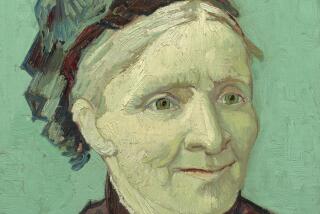In Daniela Comaniâs movie universe, gender assumptions get flipped
Turning the tables to switch the gender in pictures of men and women is a fairly simplistic strategy for an artist. For her second solo exhibition at Charlie James Gallery, Berlin-based Daniela Comani manages to make it work in surprisingly effective ways.
Just in time for the playful inanity of Hollywood awards season, âMy Film History â Daniela Comaniâs Top 100 Filmsâ does Conceptual art flip-flops in altered one-sheet posters and manipulated DVD covers. They span movie history.
The hairy ape atop the Empire State Building, batting away airplanes like flies, is now âQueen Kong.â Gender-bending David Bowie stars in âThe Woman Who Fell to Earth.â Beijingâs Forbidden City is the fortress-home in which âThe Last Empressâ is imprisoned.
Some of the illustrations come across as simple one-liners, using sharp contrast to reasonably disclose the familiar dominance of male perspectives in cinema. But others unpeel like onions, exposing resonant layers that might make your eyes water.
Most wicked is âBeau de Jour,â in which a ravishing Catherine Deneuve, naked, gives a come-hither look over her pale white shoulder at the potential movie-customer. Suddenly, the status of the five handsome men arrayed behind her is transformed.
In Luis BuĂąuelâs 1967 movie, Deneuve was the ethereal object of male desire, the latter portrayed not as monolithic but as representing a diverse range of characters. In Comaniâs ad, she is now the actor (in more ways than one) possessing diverse tastes in men, racking up beaus at her own whim.
With a decisive gesture, Comani has also defaced Deneuveâs porcelain features with a small black mustache. The actress assumes a ravenous role commonly ascribed to men.
The mustache, of course, is a nod to the one Marcel Duchamp famously scratched on a reproduction of the Mona Lisa, along with the punning letters L.H.O.O.Q. (In their slangy, run-together French pronunciation, the letters say, âShe has a hot behind.â) BuĂąuelâs movie title, âBelle de Jour,â was itself a pun, playing on belle de nuit, French vernacular for a prostitute and a twist on the movieâs married, sexually frustrated housewife secretly working weekday afternoons in a Parisian brothel.
Comaniâs deftly altered poster implies that the movie house, home of the 20th centuryâs distinctive and dominant new art form, is itself a house of ill repute. Marvelous pleasure can certainly be had there, but there is just as certainly a cost.
Charlie James Gallery, 969 Chung King Road, Chinatown, (213) 687-0844, through Feb. 21. Closed Sundays through Tuesdays. www.cjamesgallery.com
More to Read
The biggest entertainment stories
Get our big stories about Hollywood, film, television, music, arts, culture and more right in your inbox as soon as they publish.
You may occasionally receive promotional content from the Los Angeles Times.











